Tyramine is a naturally occurring amino acid and is derived from tyrosine. It is also available in certain foods. Tyramine benefits human health primarily by regulating blood pressure. However, excess consumption may trigger migraines. How can you limit tyramine consumption, and what foods do you need to avoid? This article answers all these questions. Keep reading.
In This Article
What Is Tyramine? Is It Harmful?
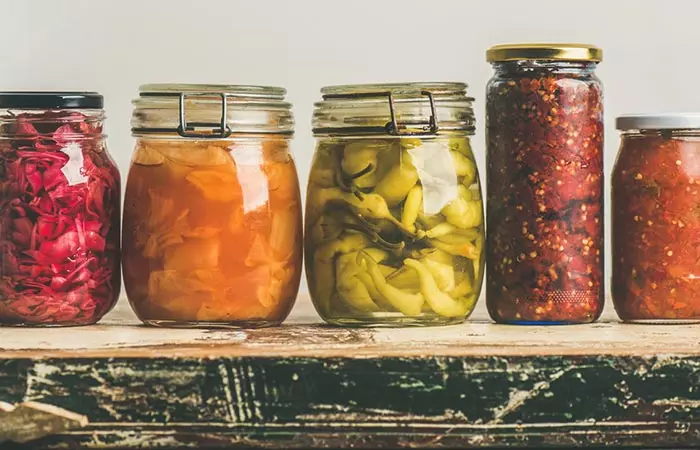
iStock
Tyramine is a monoamine (a compound that is a neurotransmitter). It is naturally found in some foods, plants, and animals. Fermentation, aging, or the spoiling of foods can also produce tyramine.
Our bodies contain an enzyme called monoamine oxidase (MAO). MAO helps process tyramine.
If you have insufficient MAO in your system, eating foods with tyramine can trigger migraines (1).
In the gut, MAO also protects against the build-up of potentially harmful substances. MAO breaks down excess tyramine in the body, which can then be excreted.
Tyramine, by itself, is not harmful as it helps regulate blood pressure levels (2).
However, if consumed in excess, if you are taking certain medications or are amine-intolerant (as discussed below), tyramine may cause blood pressure spikes that can be life-threatening (3).
Here is where we need to discuss monoamine oxidase inhibitors (MAOIs). These are medications that slow down the action of MAO. This stops MAO from preventing tyramine build-up, leading to increased levels of tyramine in your system (4).
If you also consume foods high in tyramine, it only adds to the problem by causing tyramine build-up.
Related: 15 Simple & Natural Ways To Lower Your Blood Pressure At Home
What Are The Foods High In Tyramine (To Be Avoided)?
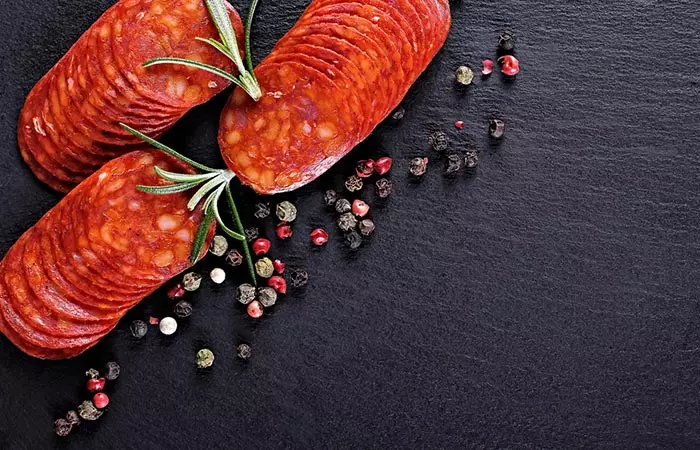
Shutterstock
If you are taking MAOIs, you must avoid the following foods (5). These contain tyramine, so taking them along with the medications can elevate tyramine to dangerous levels in your body:
- All aged and mature cheeses
- All improperly stored meats, poultry, and fish
- Air-dried sausages like pepperoni, salami, pastrami, and mortadella
- All alcoholic beverages (including unpasteurized beers and beers on tap or from microbreweries)
- Fermented soy products like soy sauce, soybean paste, fermented tofu, tamari, miso soup, natto, tempeh, shoyu, and teriyaki
- Sauerkraut
The only cheeses you can consider eating are cottage cheese, cream cheese, ricotta, part-skim mozzarella. Ensure you eat them well before their expiry date. Or even better – eat them right after opening, when they are the freshest.
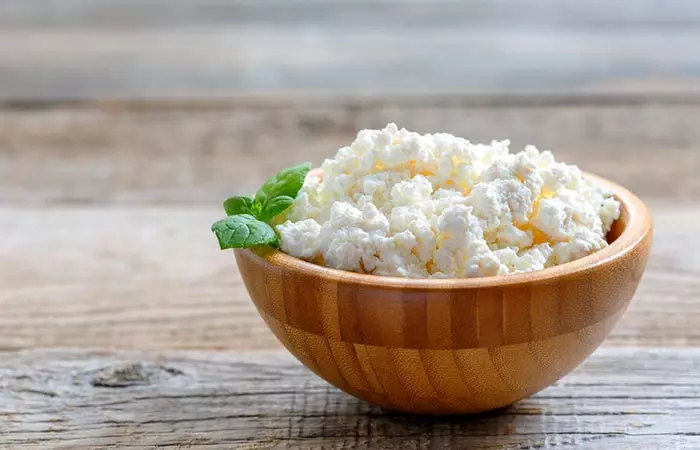
Shutterstock
Who should avoid these foods? People who are either intolerant to amines (like tyramine or histamine) or are taking MAOIs. If you have amine intolerance, you may experience heart palpitations, headaches, vomiting, and nausea (6).
Excess tyramine in your system can cause hypertensive crisis (2). This is marked by a drastic rise in your blood pressure levels. Hypertensive crisis can cause:
- Severe headache
- Nosebleeds
- Nausea and vomiting
- Fast heartbeat
- Sweating and severe anxiety
- Shortness of breath
- Blurred vision
- Confusion
Stylecraze SaysMultiple symptoms or side effects can start showing up within one hour to one day of the consumption of food with high tyramine.
But there is a way to avoid all of this – by limiting your tyramine intake.
Related: 15 Best Foods To Improve Eyesight Naturally
How Can You Limit Your Tyramine Intake?
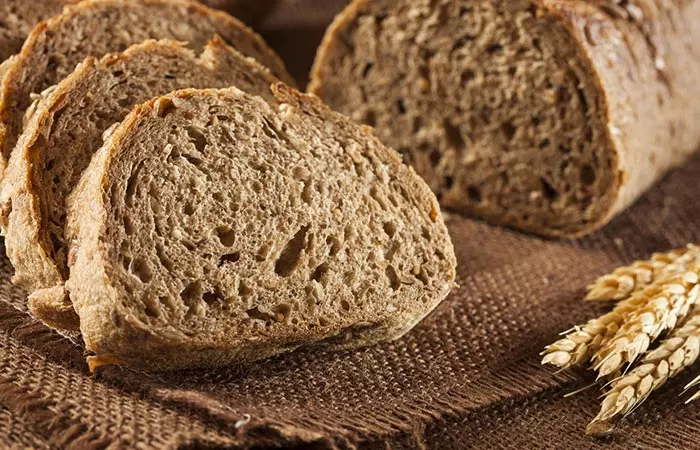
Shutterstock
The first step is to avoid foods high in tyramine. You can then replace them with the following foods (7):
- Fresh, frozen, or canned vegetables
- Fresh or frozen meats, fish, poultry, and eggs
- Legumes and nuts
- Whole wheat breads
- Cooked and dry cereals
- Fresh, frozen, or canned fruits and fruit juices
- Milk and yogurt
- Decaffeinated coffee and tea
Stylecraze SaysYou can cook food of low tyramine content with either olive oil, rice bran oil, or butter for better health.
Here are a few guidelines that can help you plan your diet:

Shutterstock
- Eat fresh produce within two days of purchase.
- Read all food and drink labels for the presence of amines. These usually end with amine in their names.
- Avoid aged, pickled, or fermented foods.
- Eat canned or frozen foods right after opening.
- Exercise caution while eating out as you don’t know how the foods have been stored.
- Toss overripe, spoiled, or moldy foods in the trash.
- Remember that cooking foods will not lower their tyramine content.
Tyramine is an amino acid present in cheeses, meat, and fermented soy products. The benefits of tyramine lie in its ability to regulate blood pressure. However, if taken in excess, it may lead to a few health complications. These effects are especially severe in those who take monoamine oxidase inhibitors (MAOIs). Tyramine buildup may trigger migraine or elevate blood pressure levels. In severe cases, it may cause nosebleeds, anxiety, shortness of breath, or increased heart rate. Avoid pickled aged products and consume fresh or canned produce as soon as possible to reduce your tyramine intake.
Frequently Asked Questions
Does tyramine cause weight gain?
No, tyramine doesn’t cause weight gain. However, excess intake may cause other side effects like migraines and drug interactions.
Is avocado high in tyramine?
Avocado contains moderate amounts of tyramine. Hence, limiting its consumption to ½ a cup a day is recommended.
Subscribe
How do you know if you are sensitive to tyramine?
If you have tyramine sensitivity, you experience symptoms like increased heart rate, skin redness, chills, hives, and frequent migraines.
Key Takeaways
- Tyramine is a monoamine (a neurotransmitter) compound naturally found in some plants, animals, and fermented, aged, or spoilt foods.
- Tyramine primarily benefits human health by regulating blood pressure, but excess consumption may trigger migraines and fluctuations in blood pressure.
- Monoamine oxidase (MAO) helps process tyramine in the body, so if you take MAOIs (monoamine oxidase inhibitors) as medication, you must avoid foods high in tyramine.
References
- “The London Letter” National Center for Biotechnology Information.
- “MAOIs and diet…” Mayo Clinic.
- “Hypertensive crisis and cheese” Indian Journal of Psychiatry, US National Library of Medicine.
- “Meal ideas and menus…” Vanderbilt University Medical Center.
- “Important information to know when you…” National Institutes of Health Clinical Center.
- “Severity to food additives, vaso-active amines…” Clinical and Translational Allergy, US National Library of Medicine.
- “Low tyramine diet” University of Wisconsin-Madison, School of Medicine and Public Health.
Was this article helpful?
Related
The following two tabs change content below.
- Reviewer
- Author

Ravi Teja Tadimalla
Ravi Teja Tadimalla is an editor and a published author. He has been in the digital media field for over… more
Rachelle Caves
(RDN, CNSC, CPT)Rachelle Caves is a Registered Dietitian Nutritionist, Certified Nutrition Support Clinician, and Certified Personal Trainer. She has significant experience providing… more



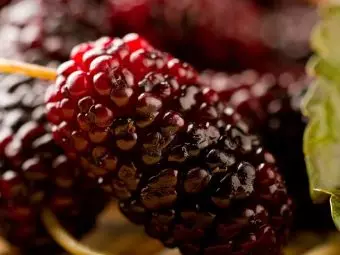 23 Amazing Benefits Of Mulberries (Shahtoot) For Skin, Hair, And Health
23 Amazing Benefits Of Mulberries (Shahtoot) For Skin, Hair, And Health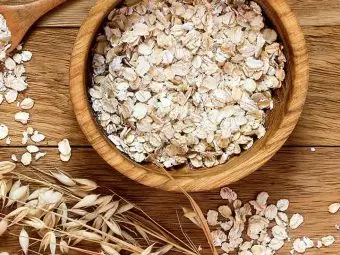 22 Best Benefits Of Oatmeal For Skin, Hair, And Health
22 Best Benefits Of Oatmeal For Skin, Hair, And Health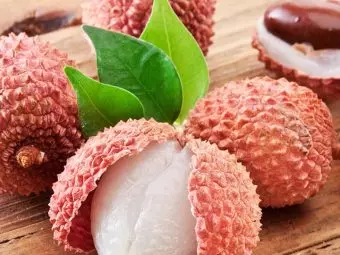 21 Amazing Benefits Of Litchis (Lychees) For Skin, Hair, And Health
21 Amazing Benefits Of Litchis (Lychees) For Skin, Hair, And Health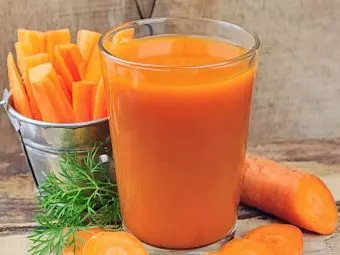 10 Nutritional Benefits Of Carrot Juice For Skin, Vision, And Health
10 Nutritional Benefits Of Carrot Juice For Skin, Vision, And Health Honey For Oily Skin – 12 Best Ways To Use It Effectively
Honey For Oily Skin – 12 Best Ways To Use It Effectively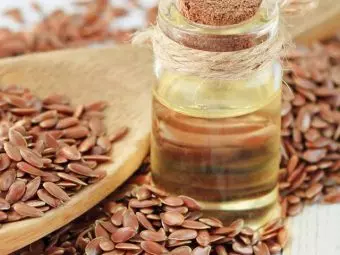 Flax Seeds Benefits & DIY Face Masks For Beautiful Skin
Flax Seeds Benefits & DIY Face Masks For Beautiful Skin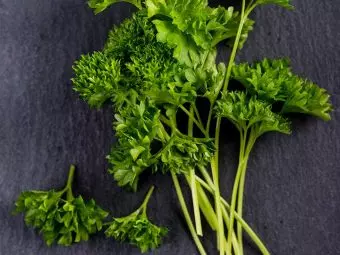 Parsley: 10 Potential Benefits And Uses, Nutrition, How To Make Tea
Parsley: 10 Potential Benefits And Uses, Nutrition, How To Make Tea 33 Wonderful Benefits Of Banana For Skin, Hair, And Health
33 Wonderful Benefits Of Banana For Skin, Hair, And Health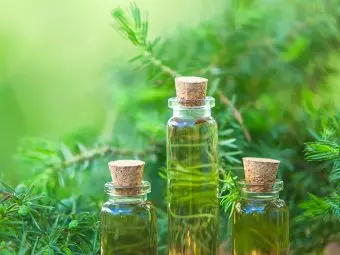 Tea Tree Oil For Warts: Benefits, How To Use, And More
Tea Tree Oil For Warts: Benefits, How To Use, And More